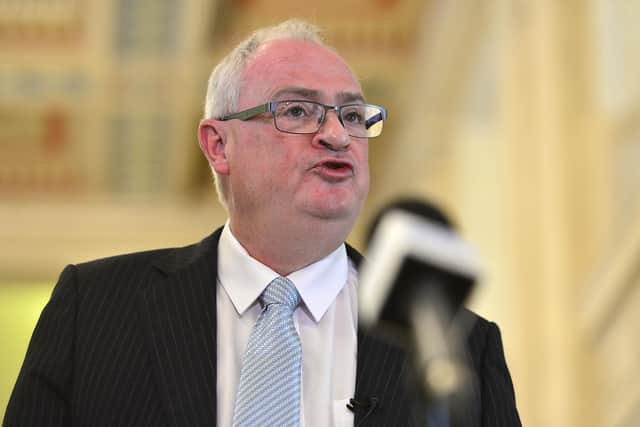UUP to raise 'inadequate' Northern Ireland civil service pay offer with Permanent Secretary as threat of strike looms
and live on Freeview channel 276
Mr Aiken, who is now the party's finance spokepserson, said he is meeting the Permanent Secretary Neil Gibson on Thursday.
In the absence of elected ministers, responsibility for the pay award has fallen to Mr Gibson.
Advertisement
Hide AdAdvertisement
Hide AdFor months, any form of pay award for the 2022/23 financial year was on ice due to the collapse of powersharing government at Stormont back in February last year.


But the passage of a legislation at Westminster, public sector pay guidance, and the introduction of a budget by the Secretary of State for Northern Ireland Chris Heaton Harris back in November meant the Department of Finance was finally in a position on Friday to announce the pay award.
It amounts to raising the pay of all employees up to at least the rate recommended by the 'Living Wage Foundation', with a £552 increase for "all eligible other staff".
When the pay offer was announced to staff by Mr Gibson on Friday, it prompted an immediate response from the trade union Nipsa who branded the offer "offensive".
Advertisement
Hide AdAdvertisement
Hide AdThe Department of Finance itself has admitted the offer is "below what staff and unions will expect in a very challenging year for the cost of living".
Nipsa, meanwhile, has already indicated that it is preparing to ballot members on possible industrial action - including a strike.
Mr Aiken, speaking to the News Letter on Monday, said: "I'm meeting with the Permanent Secretary of the Department of Finance on Thursday. We will be raising the public sector pay award and how it's inadequate for most of our public sector."
Back in October, the scale of the financial problems facing Stormont was laid bare in a written statement to the Assembly from the then Finance Minister Conor Murphy.
Advertisement
Hide AdAdvertisement
Hide AdIn his statement, the Sinn Fein minister revealed a £660 million black hole in public finances that he said was being caused by soaring inflation – with rising energy bills in particular adding to the cost of running schools, hospitals and other public services.
At that time, Mr Murphy had warned that a public sector pay offer to deal with the cost-of-living crisis would be “unaffordable” unless a budget could be agreed by a restored Executive.
The Department of Finance has now pointed to the budget ultimately passed by the Secretary of State – around a month after Mr Murphy’s statement after a deadline to restore a functioning Executive came and went without agreement – to argue that it is unable to make a higher offer.
On Friday, a departmental spokesperson said: “The Department shares the frustration of all our colleagues in the delays in implementing a pay award for 2022. The Department recognises and regrets the pay offer is below what staff and unions will expect in a very challenging year for the cost of living. Unfortunately, the Budget position does not provide any additional scope to offer a higher pay award.”